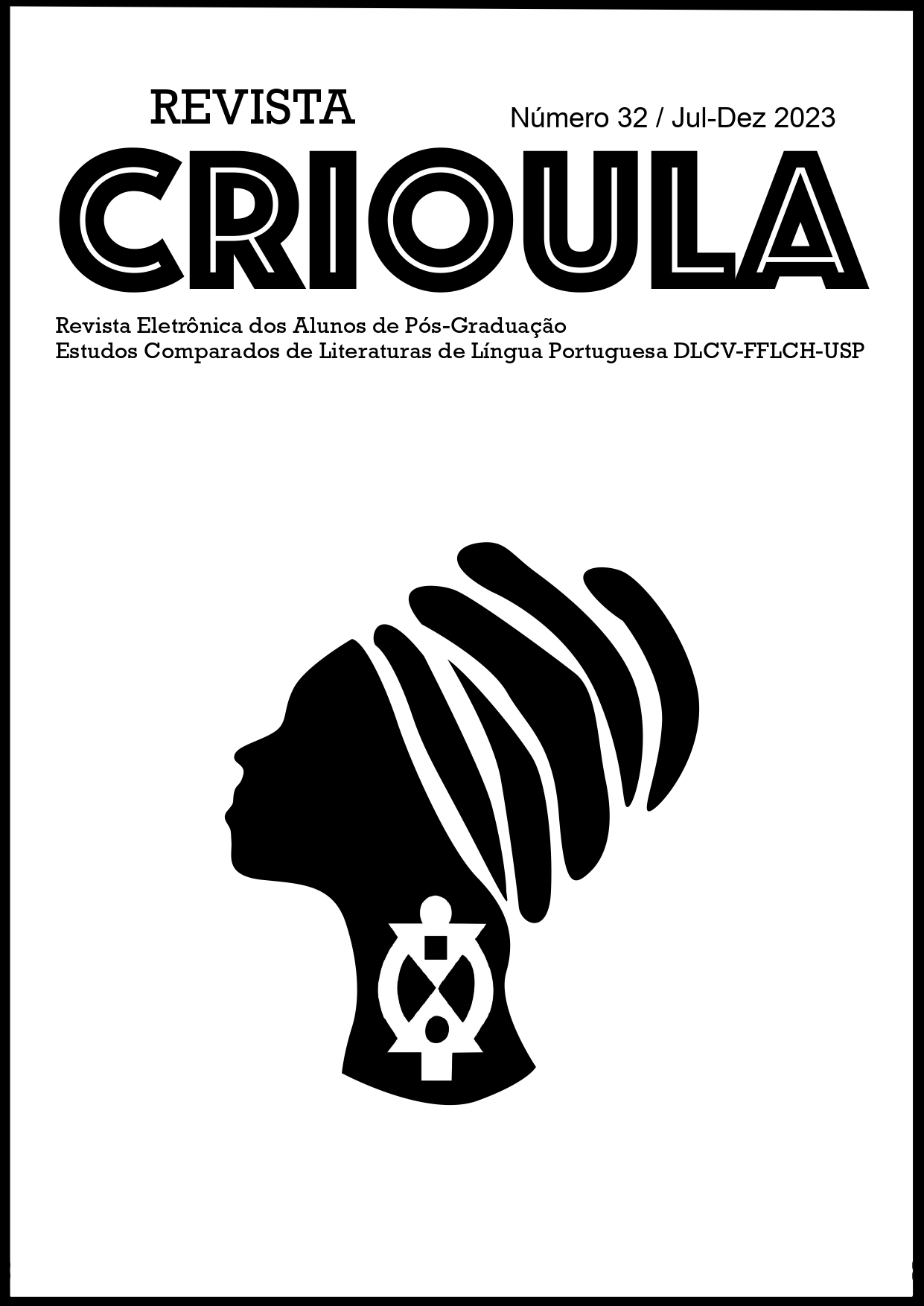Gender-based violence in Tereza Batista cansada da guerra
DOI:
https://doi.org/10.11606/issn.1981-7169.crioula.2023.213801Keywords:
Brazilian Literature, Gender, ViolenceAbstract
This paper concerns about gender-based violence in relation to the literary work Tereza Batista cansada de Guerra (1972) by Jorge Amado and it aims at seeking answers to the following questions: How is gender-based violence represented in the novel? Which female characters suffer such violence? How do they react to it? As for the theoretical background, the thoughts of Saffioti (1999), Moore (2000), Bandeira (2014), Spivak (2010), Gomes (2014), XXXXX (2020), Grijalva (2020), Xavier (2021) among others were relevant for the construction of this hermeneutical reading from the literary text, specially to notice the gender-based violence as a structural and systemic issue that subjugates women. The findings lead to the fact that gender-based violence is diversify due to the type as well as to the victimized female characters. Those prior ones may be categorized in three distinct groups: those who promote gender-based violence against other female characters; the ones who are resigned to the gender-based violence they suffer and naturalize their reality; and the ones who struggle against gender-based violence.
Downloads
References
AMADO, Jorge. Tereza Batista cansada de guerra. 3. reimpressão. São Paulo: Companhia das letras, 2008.
BANDEIRA, Lourdes Maria. Violência de gênero: a construção de um campo teórico e de investigação. Sociedade e estado, Brasília, v. 29, n. 2, p. 449-469, 2014. Disponível em: https://periodicos.unb.br/index.php/sociedade/article/view/5897/5341. Acesso 21 fev 2022.
BRASIL. Lei Maria da Penha. Lei n. 11.340/2006. Coíbe a violência doméstica e familiar contra a mulher. Presidência da República, 2006. Disponível em: http://www.planalto.gov.br/ccivil_03/_Ato2004-2006/2006/Lei/L11340.htm. Acesso em: 13 abr. 2021.
FIGUEIREDO, Euridice. Violência e sexualidade em romances de autoria feminina. Interdisciplinar, São Cristóvão, v. 32, n. 1, p. 137-149, jul.-dez. 2019. Disponível em: https://seer.ufs.br/index.php/interdisciplinar/article/download/12872/9705/. Acesso em 21 jun. 2023.
GOMES, Carlos Magno. Marcas da violência contra a mulher na literatura. Diadorim, Rio de Janeiro, v. 13, n. 1, p. 01-11, jul. 2013. Disponível em: https://revistas.ufrj.br/index.php/diadorim/article/download/3981/15576. Acesso em: 21 jun. 2023.
GOMES, Carlos Magno. O feminicídio na ficção de autoria feminina brasileira. Estudos Feministas, Florianópolis, v. 1, n. 1, p. 781-794, set./dez. 2014. Disponível em: https://www.scielo.br/pdf/ref/v22n3/04.pdf. Acesso em: 20 mai. 2021.
GRIJALVA, Dorótea Gómez. Meu corpo é um território político. Trad. Sandra Bonomini. Rio de Janeiro: Zazie Edições, 2020.
IGARAPÉ. Site do Instituto Igarapé, 2021. Sistema de Saúde no Brasil. Disponível em: https://eva.igarape.org.br/health_system/br. Acesso em: 04 abr. 2021.
MENDONÇA, João Guilherme Rodrigues; RIBEIRO, Paulo Rennes Marçal. Algumas reflexões sobre a condição da mulher brasileira da colônia às primeiras décadas do século XX. Revista Ibero-Americana de Estudos em Educação, Araraquara, v. 5, n. 1, p. 93-104, jan./abr. 2010.
OTTONI, Paulo. Visão performativa da linguagem. Campinas: Editora da UNICAMP, 1998.
PINHEIRO, Maria do Socorro. Erotismo metafísico na poesia de Gilka Machado: símbolos do desejo. 2015. 152 f. Tese (Doutorado em Literatura e Interculturalidade) – Programa de Pós-Graduação em Literatura e Interculturalidade, Departamento de Letras e Artes, Universidade Estadual da Paraíba, Campina Grande, 2015.
SAFFIOTI, Heleieth Iara Bongiovani. Já se mete a colher em briga de marido e mulher. São Paulo em Perspectiva, São Paulo: Fundação SEADE, v. 13, n. 4, p. 82-91, out./dez. 1999. Disponível em: https://www.scielo.br/pdf/spp/v13n4/v13n4a08.pdf. Acesso em: 20 mai. 2021.
SPIVAK, Gayatri Chakravorty. Pode o subalterno falar? Trad. Sandra R. G. Almeida; Marcos P. Feitosa; André P. Feitosa. Belo Horizonte: Editora UFMG, 2010.
XAVIER, Elódia. Que corpo é esse?: o corpo no imaginário feminino. Rio de Janeiro: Oficina Raquel, 2021.
Downloads
Published
Issue
Section
License
Copyright (c) 2023 Luiz Izaac dos Santos Ribeiro, Maria do Socorro Pinheiro

This work is licensed under a Creative Commons Attribution-NonCommercial-ShareAlike 4.0 International License.


